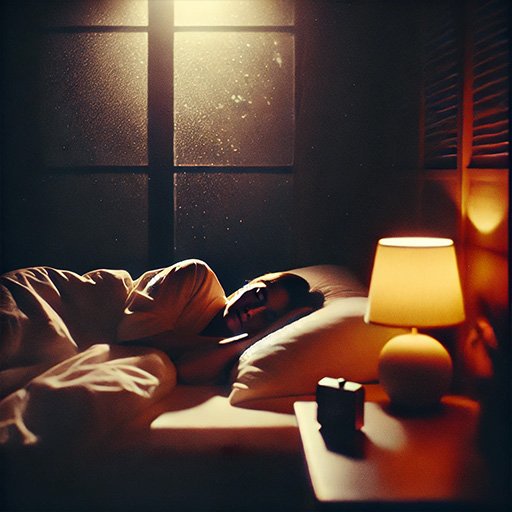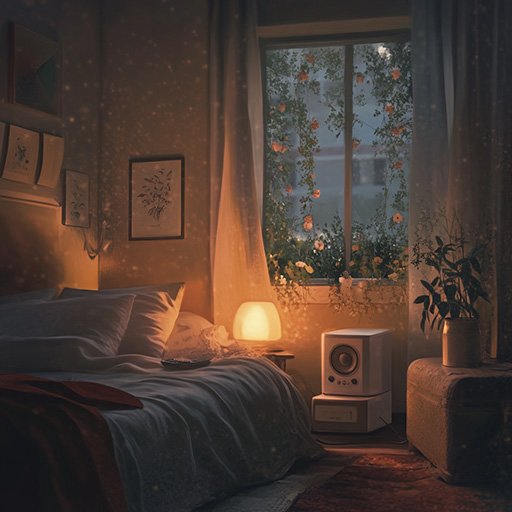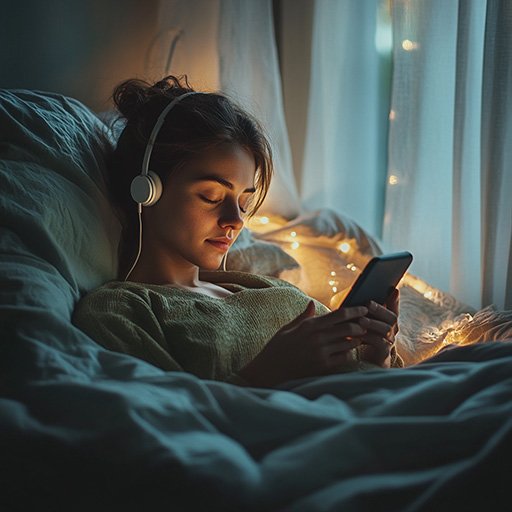Sleep Hygiene & Best Practices for Better Rest

Creating the right environment and habits is foundational for restorative sleep.
Contents
- Introduction
- Core Sleep Hygiene Practices
- Lifestyle Factors That Influence Sleep
- Common Sleep Disruptors (and How to Fix Them)
- AI & Digital Solutions for Sleep Hygiene
- Final Thoughts
- FAQ
Introduction
Quality sleep is essential for both physical health and mental well-being, yet more than one-third of adults aren't getting the recommended 7+ hours of sleep per night (CDC). This is linked to issues like higher risk of obesity, diabetes, and mood disorders. The good news is that improving your "sleep hygiene" – the habits and environment that promote healthy sleep – can make a dramatic difference.
Small changes in daily routines can lead to better sleep quality over time, helping you fall asleep faster and wake up feeling more refreshed. Health experts note that simple habit changes (like keeping a consistent bedtime and removing gadgets from the bedroom) can significantly improve sleep duration and quality.
This guide will walk you through evidence-based sleep hygiene practices and lifestyle tips for better rest. We'll also explore how modern tools – including AI-driven apps – can help track and enhance your sleep habits. By the end, you'll have a clear roadmap for optimizing your sleep and answers to frequently asked questions about getting more restorative slumber.
Core Sleep Hygiene Practices
Effective sleep hygiene centers on creating a stable routine and sleep-friendly environment. Consistency and comfort are key. Here are the core practices to incorporate:
Maintain a Consistent Sleep Schedule

Consistency is the cornerstone of good sleep hygiene—going to bed and waking up at the same times helps set your body's internal clock.
Follow Your Natural Rhythm
Our bodies follow a circadian rhythm – an internal clock that functions best with regular cycles of sleep and wake. Going to bed and waking up at the same times each day (including weekends) helps align this clock for better sleep. An erratic schedule, by contrast, confuses your body and can lead to insomnia or grogginess.
Establish Fixed Times
Experts recommend choosing a fixed wake-up time and sticking to it, as a fluctuating sleep schedule makes it hard to develop a steady rhythm (Sleep Foundation). For example, if you need to be up by 7:00 AM on weekdays, aim to wake at 7:00 AM on weekends too. Similarly, establish a consistent bedtime based on ensuring you get ~7–9 hours of sleep.
Manage Naps Wisely
Consistency also means limiting long daytime naps (especially in late afternoon) which can throw off your nighttime sleep – if you nap, keep it short (20-30 minutes) and before early afternoon. By treating sleep as a non-negotiable part of your daily schedule, you train your brain to become sleepy on cue at bedtime and wake up more easily in the morning.
Optimize Your Bedroom Environment

A white noise machine can help mask disruptive noises for a quieter sleep environment.
Control Temperature
Your sleep environment plays a huge role in sleep quality. The ideal bedroom is cool, dark, and quiet – a calm sanctuary for rest. Most people sleep best in a slightly cool room (about 65°F or ~18°C) (Sleep Foundation). Feeling too warm or stuffy can cause restlessness, so use fans, air conditioning, or appropriate bedding to keep the temperature comfortable.
Minimize Light
Even modest light can interfere with your body's melatonin production (the hormone that makes you sleepy) and disrupt your circadian rhythm (Harvard Health). Use blackout curtains or an eye mask to achieve near-total darkness, and dim any small lights (like alarm clocks or chargers) or cover them if possible. Keeping lights low in the hour before bed also helps send your body the signal that it's time to wind down.
Reduce Noise
Sudden or loud noises can fragment your sleep even if they don't fully wake you. If you live in a noisy area or have a loud neighbor/pet, consider earplugs or a white noise machine to mask disruptive sounds.
Ensure Comfort
Make sure your bed is comfortable – a supportive mattress and suitable pillow can prevent aches and tossing and turning. Soft, breathable bedding appropriate for the season (cozy enough in winter, light in summer) also contributes to comfort. Ideally, the bedroom is used only for sleep (and intimacy), not for work, studying, or watching intense TV shows. This strengthens the mental connection that bed = relaxation.
Be Mindful of Caffeine and Alcohol Intake
Manage Caffeine Consumption
Caffeine is a stimulant found in coffee, tea, soda, energy drinks, and even chocolate. It wakes you up by blocking adenosine (a chemical that makes you sleepy) and can stay in your system for 6+ hours. A study in the Journal of Clinical Sleep Medicine found that consuming 400 mg of caffeine (about 2–3 cups of coffee) even 6 hours before bedtime reduced total sleep time by over an hour (Medical News Today).
Set a Caffeine Curfew
To promote better rest, experts advise cutting off caffeine at least 6–8 hours before bed – for many people, that means no caffeine after about 2:00 PM if you plan to sleep at 10:00 PM. If you are sensitive to caffeine or have insomnia, you may need to stop even earlier (around lunchtime) or avoid it entirely. Instead, opt for decaf or herbal tea in the evening. Also be mindful of hidden caffeine sources like certain pain relievers or supplements.
Limit Alcohol Before Bed
Alcohol is another substance that can wreck your sleep quality. It's deceiving because a drink or two in the evening can initially make you feel drowsy, leading many to use alcohol as a "nightcap." However, as the night goes on and the alcohol is metabolized, it disrupts your sleep cycles. Even moderate alcohol in the evening has been shown to cause more awakenings and lighter, less restorative sleep (Sleep Foundation).
Timing is Everything
To avoid disruptions, try to limit alcohol, especially within 3–4 hours of bedtime. If you do have an alcoholic beverage in the evening, keep it moderate (1 drink) and have it with dinner rather than right before bed. Always hydrate with water as well, since alcohol can be dehydrating (which can worsen sleep).
Limit Screen Time Before Bed

Setting a digital curfew and replacing screen time with calm activities improves sleep quality.
The Blue Light Problem
Electronic screens emit blue-wavelength light, which is the most disruptive to our circadian rhythms in the evening (Harvard Health). Blue light suppresses the release of melatonin, the hormone that makes us sleepy (Sleep Foundation). Staring at a bright phone or laptop tricks your brain into thinking it's still daytime, keeping you alert when you should be winding down.
Set a Digital Curfew
To protect your sleep, set a "digital curfew." Aim to turn off or put away all electronic devices at least 30–60 minutes before your bedtime (Sleep Foundation). Use that last hour for calming, screen-free activities. If you must use a device, consider using blue-light filtering apps or glasses, and dim the screen as much as possible – but know that complete avoidance of screens is best for melatonin release.
Create a Screen-Free Bedroom
Keep devices out of the bedroom if you can. It's tempting to use your phone in bed, but doing so creates an association of the bed with wakefulness rather than sleep. At the very least, put your phone on "Do Not Disturb" mode to prevent late-night notifications or use a traditional alarm clock instead of your phone's alarm to reduce temptation.
Follow a Calming Bedtime Routine

A consistent routine with calming activities signals to your brain that it's time to transition to sleep.
Create a Gradual Wind-Down
Having a consistent bedtime routine is a powerful way to cue your body and mind for sleep. Think of it as gradually applying brakes to your day. Set aside the last 30-60 minutes of your day for winding down. Following the same relaxing sequence each night helps condition your brain to relax and transition into sleep mode (Sleep Foundation).
Choose Calming Activities
Make sure your pre-sleep activities are calming. Good options include:
- Reading (preferably a physical book or e-reader without blue light)
- Listening to soft music or an audiobook
- Gentle yoga or stretching
- Deep breathing exercises
- Writing in a gratitude journal
- Practicing meditation
Our guide on Meditation for Better Sleep offers simple techniques you can incorporate into your wind-down routine. Relaxation exercises – such as progressive muscle relaxation or mindfulness meditation – help lower physiological arousal and quiet a racing mind, preparing you for sleep.
Adjust Lighting and Follow Your Body's Signals
Lighting should be kept low during your routine – for example, you might switch to a dim lamp or use candles (safely) instead of bright overhead lights. This darkness helps your melatonin levels rise. Some people find aromatherapy helpful too; light scents like lavender have been studied for their calming effects.
If you're lying in bed for more than ~20 minutes unable to fall asleep, get up and do something quiet in low light rather than tossing and turning anxiously. This prevents your brain from associating the bed with frustration and wakefulness.
Lifestyle Factors That Influence Sleep

Reducing stress through healthy habits such as spending time outside has positive benefits for sleep quality.
Beyond your evening routine and bedroom setup, your daytime lifestyle choices greatly affect how well you sleep at night. Key factors include diet, exercise, and stress management. By making healthy choices in these areas, you'll support your overall sleep hygiene.
Diet and Nutrition
Timing Your Meals
Experts advise avoiding large meals in the last 2-3 hours before bedtime (Cleveland Clinic). Heavy or fatty meals late at night can cause discomfort, acid reflux, and interfere with your ability to fall asleep. Your body will be busy digesting when it should be relaxing.
Balance is Key
If you're peckish close to bedtime, opt for a very light snack that's easy to digest (like a small banana, a few almonds, or a warm glass of milk). Also try to finish dinner at least a few hours before lying down. On the flip side, don't go to bed starving either – being extremely hungry can be just as distracting and may cause you to wake up overnight.
Sleep-Friendly Foods and Drinks
Be mindful of beverages too. Try not to drink too much of any fluids right before bed, or you might be up for bathroom trips. Some nutrients and foods can actually promote better sleep. Complex carbs (like whole grains) at dinner can increase tryptophan availability to the brain, potentially aiding sleepiness. Certain teas and herbal supplements (e.g., chamomile, valerian root, magnesium) are often used to improve sleep quality.
Exercise and Physical Activity
Benefits for Sleep Quality
Regular exercise is one of the best daytime habits to improve your sleep at night. Research has shown that people who exercise consistently tend to fall asleep faster and spend more time in deep sleep (Johns Hopkins Medicine). Exercise, especially aerobic workouts (like brisk walking, running, swimming, cycling), can increase the amount of slow-wave deep sleep you get.

Regular physical activity, especially in natural daylight, helps regulate your circadian rhythm and improves sleep quality.
Timing Matters
For most, the best time to exercise is in the morning or afternoon. Exercising too close to bedtime (within 1-2 hours) may rev you up and make it harder to fall asleep. This is because exercise releases endorphins and raises your core body temperature, which can be stimulating. Try to finish vigorous exercise at least 3 hours before bed. If evening is the only time you can exercise, choose milder activities (like stretching or yoga) instead of high-intensity training.
Consistency Over Intensity
For sleep benefits, consistency is more important than intensity. Aim for at least 150 minutes of moderate exercise per week (the general health recommendation), which could be 30 minutes on most days. This could include anything that gets your heart rate up: jogging, dancing, cycling, swimming, or even active housework.
Stress Management and Relaxation
Break the Stress-Insomnia Cycle
Stress and insomnia frequently go hand-in-hand in a vicious cycle: stress can cause sleep problems, and lack of sleep can further heighten stress and anxiety (Sleep Foundation). Thus, managing daily stress and practicing relaxation techniques are crucial parts of good sleep hygiene.
Evening Boundaries
Try to unplug from work and news well before bedtime. Set boundaries such as not checking work email after a certain hour. Many people find that writing down their thoughts or a to-do list in the early evening helps prevent rumination at bedtime – it's a way of telling your brain "you have captured these concerns, now you can let them go for the night."

Relaxation practices before bed help calm the nervous system and prepare the mind for sleep.
Practice Relaxation Techniques
Techniques like deep breathing, progressive muscle relaxation, meditation, and gentle yoga can significantly reduce physiological arousal. By slowing your breathing and heart rate, and releasing muscle tension, you send a signal to your nervous system that it's safe to calm down. Even just 5-10 minutes of mindful breathing or listening to a guided relaxation audio at bedtime can make a difference.
Address Persistent Worries
If you often lie in bed anxious about not sleeping or other life problems, cognitive behavioral therapy for insomnia (CBT-I) techniques can help break that cycle. (See our CBT Techniques for Insomnia guide for in-depth strategies.) One CBT-I method is to schedule a "worry time" earlier in the evening: set a 15-minute window to write down everything that's on your mind and possible solutions, then close the notebook and treat that as putting your worries "to bed" for the night.
Common Sleep Disruptors (and How to Fix Them)
Even when you know the best practices, it's easy to fall into habits that sabotage your sleep. Here are some common mistakes people make that harm sleep quality, and how to correct them:
Irregular Sleep Times
Going to bed and waking up at drastically different times each day confuses your internal clock. This "social jetlag" can make it hard to fall asleep when you want to. Fix: Set a regular schedule (even on weekends) (Sleep Foundation). If you need extra sleep, sneak in a brief nap or go to bed a bit earlier rather than sleeping until noon Sunday.
Screen Use in Bed
Browsing your phone or watching TV in bed exposes you to bright blue light and stimulates your mind, making it harder to nod off. Fix: Establish a rule of no electronics in bed. Reserve your bed strictly for sleep (and intimacy), not scrolling social media. Set an electronics cutoff 30-60 minutes before bedtime and stick to it.
Late-day Caffeine or Big Meals
Having coffee, energy drinks, or other caffeine late in the afternoon or evening is a recipe for poor sleep – as noted, caffeine can disrupt sleep even 6 hours later. Similarly, eating a heavy meal or spicy food right before lying down can cause indigestion. Fix: Cut off caffeine by early afternoon, switch to decaf in the evening. And try to finish dinner at least 2-3 hours before bed.
Excessive Napping or Napping Late
While a short power nap can be refreshing, long or late naps can steal sleep from your night. Fix: Limit naps to ~20-30 minutes and take them early (ideally before 2–3 PM). If you have insomnia, you might skip naps altogether for a while to build sleep drive for nighttime.
Using Bed for Work or Stressful Activities
Many people bring laptops to bed to finish work or lie in bed ruminating about problems. This causes your brain to associate the bed with wakefulness and stress. Fix: Do work and other alert activities outside the bedroom. Create a wind-down buffer before bed to disconnect from stressful thoughts.
Sleeping Environment Issues
A bedroom that's too bright, noisy, or hot will fragment your sleep. Fix: Make your room as dark and quiet as possible (use eye masks, earplugs, white noise, or dark curtains). Adjust the thermostat or use a fan to keep it cool (around 65°F). Ensure your mattress and pillows aren't causing discomfort.
AI & Digital Solutions for Sleep Hygiene

Modern technology offers powerful tools to track, analyze, and optimize your sleep habits.
Modern technology isn't only a hindrance to sleep; it can also be harnessed to improve sleep habits. A wave of AI-based apps and digital tools have emerged to help people track, analyze, and optimize their sleep. These tools can act like a personal sleep coach in your pocket, providing data and guidance tailored to you.
Sleep Tracking and Analytics
Wearable devices (like fitness trackers and smartwatches) and smartphone apps can monitor your sleep patterns – measuring how long you sleep, your sleep stages, and even your heart rate or movement during the night. By reviewing this information, you can identify trends and problems. Simply being aware of your sleep metrics can motivate you to stick to a better routine. Many apps also let you log lifestyle factors – caffeine intake, mood, exercise – so you can see correlations (e.g., "On days I meditated, I fell asleep 15 minutes faster").
Digital CBT Programs and Sleep Coaches
One of the most promising developments is the rise of digital Cognitive Behavioral Therapy for Insomnia (dCBT-I) programs. The American Academy of Sleep Medicine recommends CBT-I as the first-line treatment for chronic insomnia (AASM), and when in-person therapy isn't accessible, digitally delivered CBT-I can be a game-changer. These programs often involve modules on sleep hygiene, relaxation training, sleep scheduling, and thought reframing, along with interactive tools like sleep diaries.
Evidence from clinical trials shows that these digital interventions can significantly improve insomnia severity and sleep quality for many people (often comparable to results from traditional therapy). If you struggle with insomnia, using a well-designed app of this kind can guide you step-by-step through proven strategies.
AI-Powered Virtual Sleep Assistants
Wellness AI, for instance, (the platform behind this guide) uniquely combines an AI therapy chatbot with personalized guided meditations to help users with stress and sleep. You can chat with the AI about your sleep anxiety or the rough day that's keeping your mind racing, and it will respond with CBT-based techniques to challenge worries. After the conversation, the app can generate a custom sleep meditation tailored to you, to help you wind down.
This two-pronged approach addresses both the mental and physiological aspects of sleep hygiene – easing stress through conversation and then promoting relaxation through meditation. By adapting to your input over time, an AI virtual coach can notice patterns (like "you seem to have trouble sleeping on Sunday nights") and proactively offer tips or exercises.
Smart Devices for Sleep Environment
Technology offers gadgets that improve your sleep setting. "Smart" bedroom devices include adjustable smart beds that change firmness or angle, smart thermostats that lower the temperature at night, and smart lighting that gradually dims as bedtime approaches. There are also sunrise alarm clocks that simulate a sunrise to wake you more naturally (helpful for consistent wake times, especially in dark winter months).
Of course, technology is a double-edged sword – you want to use these tools in a way that doesn't reintroduce too much screen time or stimulation at night. The best approach is to use apps and devices as facilitators, while still following the fundamental sleep hygiene habits we covered.
Final Thoughts
Improving your sleep is one of the most impactful things you can do for your overall wellness. By practicing good sleep hygiene – keeping a regular schedule, making your bedroom a sleep haven, watching what you consume, and winding down properly – you're setting up the conditions your body needs to sleep well.
It's normal to slip up occasionally or have an off night, so don't get discouraged. What matters is the long-term pattern. Keep at it, and if you introduce changes, give them a couple of weeks to see effects. Often it's the combination of multiple small improvements that yields a big result.
Start with a couple of the easiest tweaks for you – say, no phones after 10 PM and lights out at 11 PM nightly – and build from there. Be patient with yourself and stay consistent. Here's to developing great sleep hygiene and enjoying the better rest that comes with it!
Get Personalized Sleep Support
Try Wellness AI for custom sleep coaching and personal guided sleep meditations tailored to your unique needs.
FAQ
How long does it take to see improvements in sleep?
It depends on the person and which sleep issues you're addressing, but many people start noticing some improvements within a week or two of consistent changes. Bigger issues like chronic insomnia might take 4-8 weeks to show significant improvement. The key is consistency – some changes (like cutting caffeine) can have near-immediate effects, while others (like shifting your circadian rhythm) take longer. Track your sleep to spot improvements, and if after a month of diligent practice you see no improvement, consider consulting a doctor as there may be underlying issues.
Can AI really help with sleep hygiene?
Yes, AI and digital tools can be very helpful as part of a sleep improvement plan. AI-driven insomnia apps (digital CBT-I programs) have shown success in clinical studies, effectively helping users fall asleep faster and reduce insomnia symptoms (AASM). AI chatbots can simulate conversations with a coach or therapist at any time, offering tips when you're struggling or helping reframe anxious thoughts. The advantage is 24/7 availability, personalized recommendations, and the ability to track patterns in your sleep data that you might miss. When used correctly, AI can turn your smartphone from a sleep distraction into a sleep-enhancing device.
What's the best sleep routine for someone with insomnia?
The ideal routine for insomnia incorporates consistency, relaxation, and stimulus control. Key elements include: maintaining a fixed wake-up time every day (even weekends); a 30-60 minute wind-down period with calming activities; avoiding screens at least 30 minutes before sleep; practicing relaxation techniques like meditation or deep breathing; optimizing your bedroom environment (cool, dark, quiet); using the bed only for sleep and intimacy; and getting up after 20 minutes if you can't fall asleep rather than lying in bed frustrated. This routine helps retrain your brain to associate bed with sleep and builds a strong circadian rhythm. For severe insomnia, a technique called sleep restriction (limiting time in bed to build sleep drive) might be needed – explore that with a professional or through a CBT-I program.
Is it okay to nap during the day?
It depends on your overall sleep health. For people who sleep well at night, a short power nap (20-30 minutes) in the early afternoon can be refreshing without disrupting nighttime sleep. However, if you have insomnia or sleep difficulties, napping can reduce your sleep drive and make it harder to fall asleep at night. Best practices include: keeping naps to 30 minutes or less, napping before 3 PM, and avoiding naps altogether if you notice they interfere with your nighttime sleep. In some cases (like shift work or for safety when extremely tired), naps are necessary and beneficial. Know your own patterns and adjust accordingly.